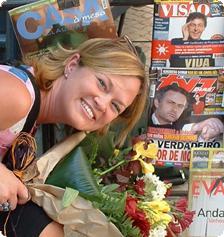by Stephanie Block
Left To Tell is Anne Frank walking to freedom and Hotel Rwanda combined, a truly horrific and horrifically true story. Yet the book seems very unreal in a lot of ways because Immaculée lets us straight into her tormented soul, bright with devotion and torn apart by genocide. Will she survive? Will her faith?
Emphatically yes! Immaculée was among those left to tell the story of the Rwandan genocide, and she might tell you herself that she was left to tell for a reason, this reason. She was left to tell about the sickening period of hatred and death when Hutu neighbors turned on their Tutsi friends and slaughtered a million souls in cold blood. And she was especially left to tell us that not even these are good enough reasons to despair.
You or I might think that being forced to go into hiding for your life for 91 days in a tiny bathroom with first five and then seven other Tutsi women is reason enough to hate the killers and to blame God for sending them. But not Immaculée, not even when faced with situations like this on a daily basis:
“Hundreds of people surrounded the house… They whooped and hollered. They jumped about, waving spears, machetes, and knives in the air. They chanted a chilling song of genocide while doing a dance of death: ‘Kill them, kill them, kill them all; kill them big and kill them small! Kill the old and kill the young… a baby snake is still a snake, kill it, too, let none escape!’” (77)
Immaculée and her secret sisters had to be perfectly quiet at all times- not only were the killers in the street, but the brave Hutu pastor hadn’t even told his own family that he was hiding these most hated of humans. The women quickly developed their own sign language mostly dealing with rotating positions in the cramped bathroom. Bathing was unthinkable because it would be heard throughout the house, and even flushing was perilous unless exactly timed with another toilet.
The nation was gripped by a total failure of humanity- the corpses piled up and neighbors-turned-killers prowled the streets drunk with bloodlust and high on drugs. The viral hatred spread quickly, institutionalized via radio waves whipping the population into a killing frenzy:
“…Pastor Murinzi turned on the radio in his bedroom [loudly so we could hear it in the bathroom]. The new president of Rwanda was speaking, and our ears perked up when we heard him say the name of our home province… ‘I want to personally congratulate the hardworking Hutus of Kibuye for their excellent work… More of our Tutsi enemies have been killed in Kibuye than in any other province…’ The president was so pleased with the ‘good work’… that he promised to send thousands of dollars to buy food and beer so that the killers could celebrate properly…. ‘After… the enemies are dead, we will live in paradise. We will no longer have to compete for jobs with cockroaches.’” (98)
Violence had become a national pastime and Immaculée was bearing witness to a frightening new consciousness. “The world had seen the same thing happen many times before. After it happened in Nazi Germany, all the big, powerful countries swore, ‘Never again!’ But here we were, six harmless females huddled in darkness, marked for execution because we were born Tutsi. How had history managed to repeat itself?” (86)
When the Hutu death machine hummed without check, when her own friends and neighbors were hunting her down, and when hope seemed like an impossible luxury, Immaculée turned to God:
“Seven weeks in the bathroom had left us all frighteningly gaunt… Sitting on the hard floor became increasingly uncomfortable as our muscle and fat disappeared, leaving us with no padding on our bottoms… the bathroom grew roomier… We were shrinking… Since we hadn’t showered or changed our clothes since we arrived, we were plagued by a vicious infestation of body lice… We may not have been a pretty sight, but I’d never felt more beautiful. Each day I awoke and thanked God.” (113)
Left To Tell: Discovering God Amidst the Rwandan Holocaust is a book about turning the other cheek even when that cheek is hollowed out with starvation and infested with bites from body lice.
We readers would have fallen in love with Immaculée even if her faith was all gone, driven away by her family’s murderers, by her loss of every right she ever enjoyed. It would have been okay with us if she had abandoned religion the way it seemed to abandon her. What other conclusion, as the world’s superpowers ignored her plight, could she have reached? Of course her faith was dead.
But it wasn’t dead. It lived. And it grew stronger. Mightier. Love was the key that unlocked her salvation and her survival. Can you imagine?
Day and night, hours upon hours a day, Immaculée whispered to God. A devout Catholic clutching the rosary her father had given her, she experienced dreams and visions in a heightened state of fervent prayer in her tiny prison that had become her sanctuary: (emphasis hers)
“The killers were in the [Pastor’s house]…I’m praying so hard, God, so hard… but they’re so close and I’m so tired! Oh God… I’m so tired… I felt faint… I floated like a feather above the other women… I looked up and saw Jesus hovering above me… Suddenly I was back on the floor again with the others. Their eyes were still closed, but mine were wide open, staring at a giant cross of brilliant white light stretching from wall to wall in front of the bathroom door… I knew instinctively that a kind of Divine force was emanating from the cross, which would repel the killers.” (131)
The killers did not find her then, nor ever. She seemed impervious to discovery. Who’s to say what was real in the midst of that terrible reality? Months ago, it would have seemed totally absurd for her not to know if her family was alive or dead.
“I was born in paradise.” This is the first sentence of Immaculée’s book. We can only assume that this is going to be a paradise lost story. But it’s the opposite- a paradise captured and expanded, a paradise glowing and growing. Immaculée is her own story’s paradise, the only place left for hope to hide out.
And paradise begins, of course, with a loving family in the beautiful hills of her village with a view of Lake Kivu. Neighbors and friends, even a boyfriend at school. She loses it all and we lose it with her.
Of course she was angry and confused at first, but Immaculée reached a major turning point as she grappled with God. She came to a simple and profound realization: “The killers were like children… Despite their atrocities, they were children of God, and I could forgive a child, although it would not be easy… especially when that child was trying to kill me.” (94)
After struggling with the language of God’s love in the Bible, she began to struggle with another language. This, too, was a sign from God, a flash of pure understanding of her destiny. She knew that she would need to be able to speak English someday, so she began to teach herself with two books from the pastor’s library and a French-English dictionary:
“Three weeks after I started this endeavor, I’d already read the two books that the pastor had given me from cover to cover. I was ready to move on to the next level: to teach myself to write in English. I borrowed a pen and paper from the pastor and began composing a letter. I wrote to a man who didn’t exist yet, but who was someone I believed in with all my heart- our rescuer.” (117)
Would I have been able to do what she did? That might be the question you end the book with- or the criticism you poke yourself with: I would never have been that good. I would have grabbed a machete and struck back at the people who killed my family. And why wouldn’t you feel that? But maybe just knowing that Immaculée didn’t is enough. Immaculée writes:
“…[A] woman in Atlanta…approached me in tears at the end of a talk I gave. She told me that her parents had been killed in the Nazi Holocaust when she was a baby: ‘My heart has been full of anger my entire life… But hearing your story about what you lived through and were able to forgive has inspired me.’”
Immaculée’s healing didn’t start after she was rescued- it began in the dark before there were rescuers. Before there was a publishing contract or French troops. Healing began in the height of sickness. That’s how you salvage the cells of love.
* * * *
Today, Immaculée is happily married with children and living in the U.S. She has devoted her
life to writing, lecturing and working with humanitarian organizations that help women and children of war torn regions. She has started the Left To Tell Charitable Fund.
You can buy this extraordinary book on her website, www.lefttotell.com, or on www.amazon.com.
You can also read about this and other amazing books on our Tango Diva Essentials page.
One last note: I first learned about Immaculée Ilibagiza while watching Dr. Wayne W. Dyer speak on PBS. The famed inspirational speaker introduced Immaculée as someone who had deeply inspired him. I sat in my living room, riveted, as she got up on stage to thundering applause. They are great friends, and he penned the book’s foreword.
*The photos of Immaculée and her family that accompany this article were provided by and are owned by Immaculée Ilibagiza.













